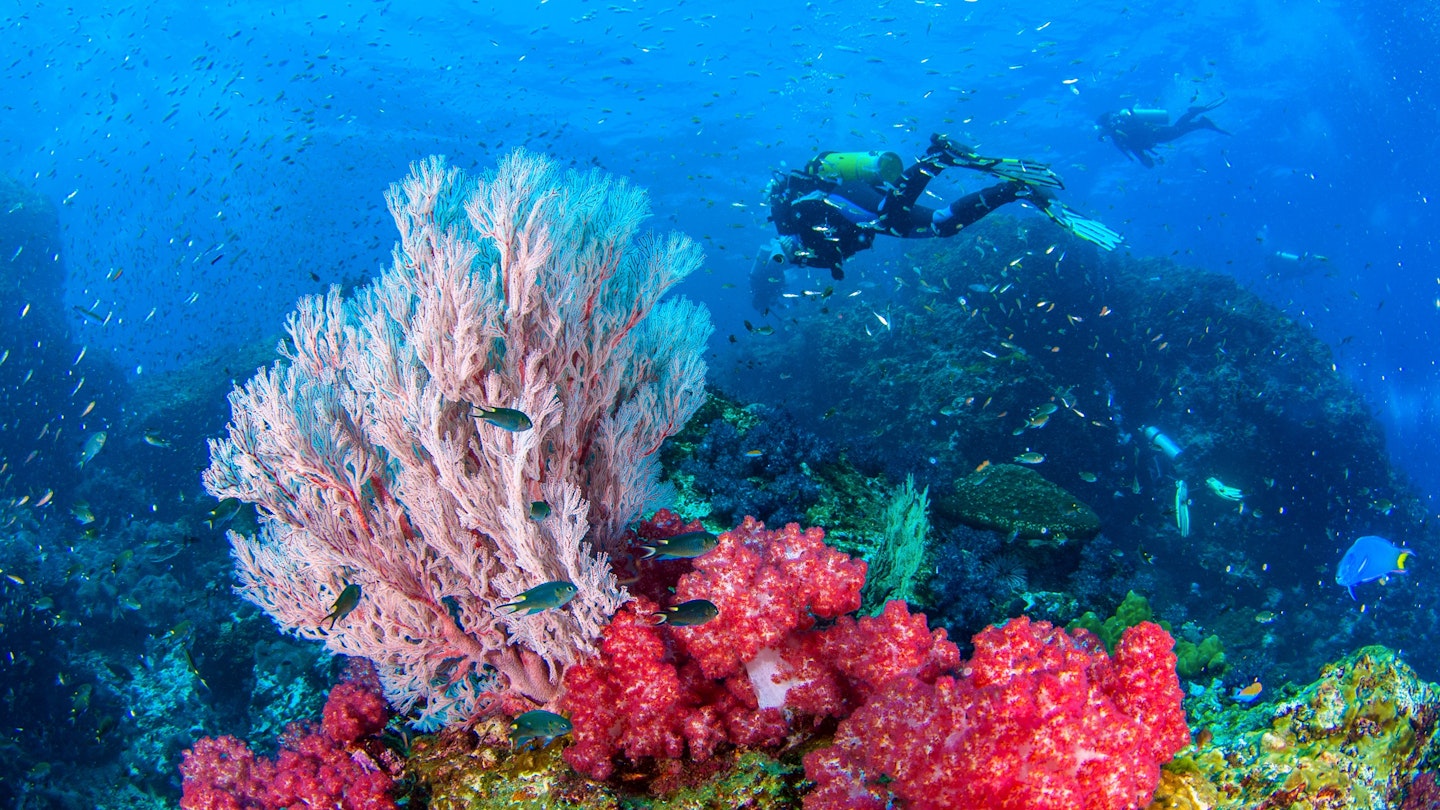In the entire cosmos, there’s only one blue planet – ours. The oceans are home to some of the world’s most incredible wildlife, including many endangered creatures threatened by rising temperatures, changing pH levels, and plastic waste. Thus, it is crucial to seek out cruelty-free, sustainable scuba diving experiences that value animal welfare to preserve these remarkable species. Here are some tips to help you be a responsible diver.
Identify Responsible Dive Operators
Whenever possible, seek sustainable diving opportunities at marine-protected nature reserves where the safety of fish is considered a high priority. Sea Saba in the Caribbean takes guests to the Saba Marine Park for project-based adventure programs, such as helping maintain the coral nursery and researching reef ecology.
Dive operators should offer small group excursions of fewer than ten divers and provide a licensed guide for every four divers. Dive sites should be selected not only based on weather conditions but also on the divers’ experience, ensuring that the impact on coral is minimized. Always listen to your guide if they alert you to potential dangerous behaviors. Dive schools should strictly enforce a no-touch and no-feeding policy for marine life—even an empty shell could provide shelter for a hermit crab. Divers should also be encouraged to avoid using fins, as this stirs up the ocean floor, allowing sand to settle and suffocate coral.
A dive boat that prioritizes the environment will be equipped with reusable cups, water jugs, cotton towels, and natural mask defoggers. Sustainably-minded dive centers will limit the use of equipment that disturbs marine life, opting for tools such as Blue UV flashlights during fluorescent night dives to preserve the underwater ecosystem. For instance, the dive shop at Victoria House Resort and Spa in Belize only utilizes reef-safe products in biodegradable containers.
Consider an Electric Motor, or No Boat at All
If the dive center is situated on an island and has a house reef, ask if any of the dive spots are accessible by swimming from the beach. This approach helps avoid polluting the water with boat fuel. If the dive center has a dock, check if it was built beyond the reef’s edge to prevent harm to coral.
If a boat is necessary to reach off-site dive locations, support operators that use electric boat motors. Many dive sites exist within fragile ecosystems at risk due to fuel-powered boats. When carbon dioxide from burning boat fuel dissolves into the ocean, it can lead to acidification and algal blooms, as well as increased ocean temperatures and rising sea levels. Electric motors significantly reduce the negative impact on marine life by limiting fuel and noise pollution. For example, MahaRaja Eco Dive Lodge in Raja Ampat, Indonesia uses electric motors supplied by Torqeedo.
Look for Certification and Codes of Conduct
Choose responsible operators: Green Fins members have committed to a strict environmental code of conduct, including regular ocean cleanups, proper waste disposal, and no-touch policies. Members are assessed and certified annually, such as Tioman Dive Centre in Malaysia and Evolution in the Philippines. Support businesses with eco-friendly practices like rainwater reuse, solar energy, and vegan meal options.
Reef Check monitors, restores, and maintains coral reefs globally, providing EcoDive certifications to venues like Baros Maldives, which employs a resident marine biologist to protect the surrounding natural reef. Additionally, Blue Flag certifies sustainable boating tourism operators that adhere to stringent criteria.
How to Avoid Greenwashing
Any eco-dive center should readily explain their environmental protection strategies. It is important to research and stay vigilant against greenwashing—where businesses attempt to appear more sustainable than they truly are. Outright red flags include dive centers that promote interactive animal experiences or showcase photos of divers touching aquatic life. Avoid tours with operators that engage in baiting or chasing sharks or whales. Remember, reputable dive operators should never guarantee sightings of specific creatures while diving.
Being Responsible on the Dive
Scuba divers will inevitably impact the environment. Most harm results from boat fuel, improperly disposed plastic waste, coral destruction, and fishing, all of which can be fatal for marine life. Divers can adhere to eco-standards for preserving the sea and its inhabitants by minimizing their impact on the marine environment. Take a pledge to follow planet-friendly dive policies. Respect all marine life by refraining from touching, harassing, feeding, or killing any sea creature, and be cautious not to hold, stand on, or kick coral.
Utilize all-natural mineral biodegradable sunscreen to avoid harmful chemicals, such as oxybenzone, which can cause viral infections in corals. Purchase biodegradable toiletries and stay at dive resorts that use septic systems to keep harmful wastewater from entering the ocean.
Cigarettes are among the top polluters of the sea; hence, a responsible diver would never dispose of one in the ocean. Abstain from throwing organic waste into the water. While fruit peels are biodegradable, they do not constitute natural food sources for marine life and can disrupt the ecosystem.
Remove any trash encountered in the ocean during your dive, as marine life should never be extracted from their habitat. Do not take or purchase anything that originated from the sea, including seashells or coral.
These eco-efforts play a critical role in conserving the ocean and its diverse species, ensuring that divers can continue to enjoy ethical experiences in the underwater realm. Divers serve as ambassadors for the sea and must take responsibility for the impact we have on the world’s oceans.





